This section lists all pre-, graduate and post-graduate students that have received training at our lab
or that have participated in developing molecular methods, logistical aids and software for us.
(Last updated: February 15, ©2024).
| Estefania Jurado Sánchez (December 2023 to present) Stef is currently working towards a medical degree in medicine at San Luis Potosi State University’s Faculty of Medicine currently in her fourth year. Stef is currently involved in research activities at our lab having to do with medical assessment and follow-up of biomedical personnel having high occupational risk for hantaviral diseases. |
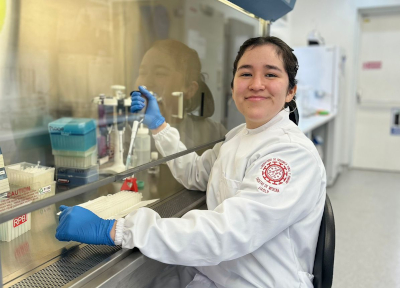 |
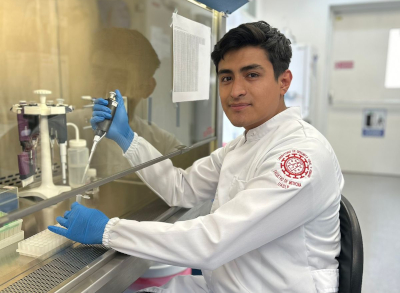 |
Claudio Saul Ferrer Pérez (Aug 2023 to present) Claudio is currently pursuing a bachelor’s degree in Enviornmental Science and Health from San Luis Potosi State University’s Faculty of Medicine, Enviornmental and Health Applied Research Center. He was involved in undergraduate training at our lab from august 2023 to december 2023 working on hantaviral risk assesment. As part of his professional practice work he participated in assessing domestic, recreational and occupational risk factor contribution to hantavirus infections through an interview form. |
| Nea Lapinkoski (Summer 2023) Nea is currently working towards a bachelor’s degree in medicine at University of Turku at Turku, Finland currently in her second year. Nea was an international visiting student tasked with a short research stay at our lab as part of The International Federation of Medical Students Associations (IFMSA) exchange program. |
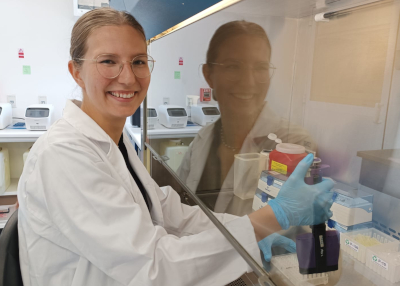 |
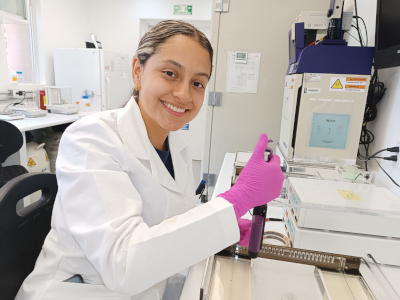 |
Andrea Lizeth Salinas Gómez (2022 to present) Andrea is currently pursuing a bachelor’s degree in pharmaceutical chemistry biology from San Luis Potosi State University’s Faculty of Chemical Science. She was involved in undergraduate training at our lab from july 2022 to july 2023 and is currentlly involved in the study of Seoul hantavirus seroprevalence in humans as part of her professional practice work. |
| Beril Iş (Summer 2022) Beril is a Turkish national second year medical school student at Università di Bologna. She was an international exchange student participating in a short research stay at our lab as part of The International Federation of Medical Students Associations (IFMSA) exchange program. |
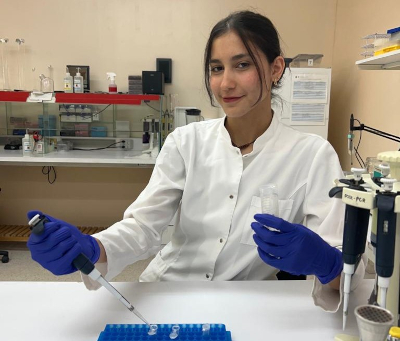 |
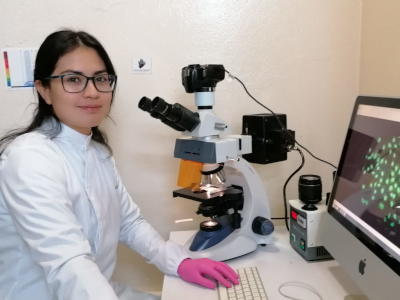 |
Mariel Pacheco Cortez (2021-2023) Mariel holds a bachelors degree in pharmaceutical chemistry biology from Universidad Juárez del Estado de Durango's Faculty of Chemical Sciences. During autumn of 2020 she worked at our lab as a pre-graduate student working with hantavirus screening through RT-PCR. She worked towards a master's degree and studied the incidence of Seoul (SEOV) hantavirus in wild rodents, lab rats and occupational risk lab workers and scientist. |
| Juan Manuel Mendoza Méndez (2021 to present) Manuel holds a bachelor's degree on nursing from Universidad Autónoma de San Luis Potosi's (UASLP) Faculty of Nursing as well as a master's degree on Basic Biomedical Science from UASLP's Faculty of Medicine. He is currently working towards a PhD developing and applying a comprehensive oligonucleotide primer panel for the identification of new world hantaviruses of Mexican relavance (SNV, HUIV, MTNV and CARV) in wild mexican rodents collected from the states of Sonora, Queretaro and San Luis Potosi. |
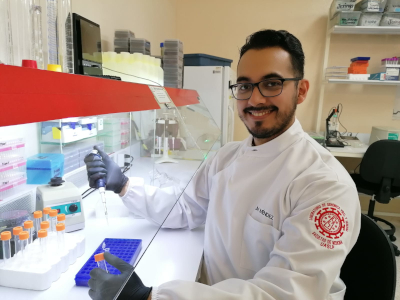 |
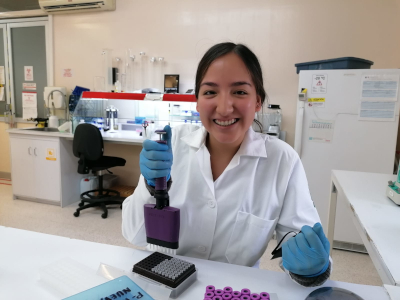 |
Regina Soto Soto (2021) Regina is an undergraduate Environmental and Health Sciences student at Facultad de Medicina, Universidad Autónoma de San Luis Potosi. She was involved in optimizing mosquito DNA extractions as part of her undergraduate social service. |
| Hannia Juliette Sandoval Flores (2020-2021) Hannia is an undergraduate Medical School student at Facultad de Medicina, Universidad Autónoma de San Luis Potosi. She was involved in the screening of bat and rodent samples for the presence of Hantaviruses and beta-coronaviruses (SARS-CoV, SARS-CoV-2, OC43, HKU1 and MERS) through RT-qPCR as part of her undergraduate research stay. |
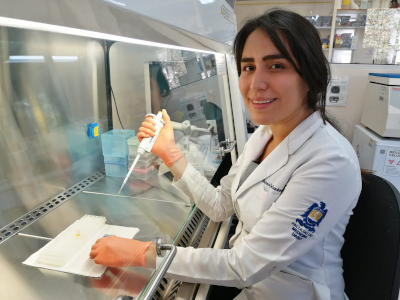 |
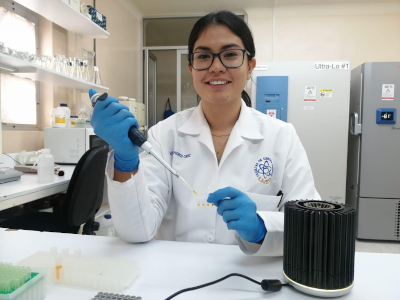 |
Mariel Pacheco Cortez (2020) Mariel is an undergraduate Pharmacobiological Chemistry student at Universidad Juárez de Durango. She was involved in the screening of rodent RNAs for the presence of Hantaviruses through qRT-PCR as part of her undergraduate research stay. |
| Nidya Jurado Sanchez(2020-2022) Nidya holds a bachelor's degree in chemistry from Facultad de Ciencias Químicas, Universidad Autonoma de San Luis Potosi. She was working towards a master's degree at our lab and involved in arbovirus (Dengue, Zika and Chikungunya) and mosquito vector (Aedes, Anopheles and Cullex) surveillance. |
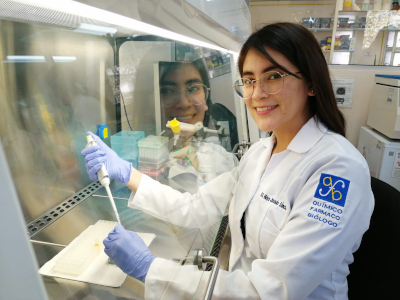 |
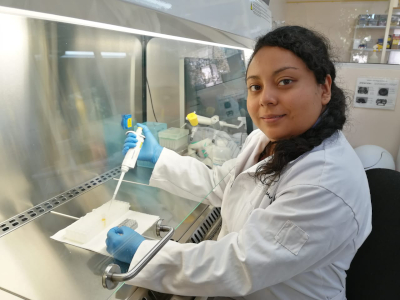 |
Ana Mariela Juarez Muñiz (2020-2021) Mariela is currently a student of Environmental and Health Sciences at the Facultad de Medicina, Universidad Autonoma de San Luis Potosi. She was involved in a short social service research stay working with the optimization of Rabies virues (RABV) Direct Fluorescent Antibbody Testing (DFAT) as part of the Emerging Global Threats (URGE) project. |
| Rodrigo Velarde Salcedo (2018 to 2019) Rodrigo is an undergraduate Pharmacobiological Chemistry student at Facultad de Ciencias Químicas, Universidad Autonoma de San Luis Potosi. He was involved in the development of a DNA molecular weight marker for in house use as part of his undergraduate social service. |
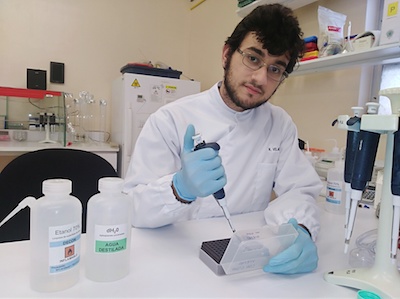 |
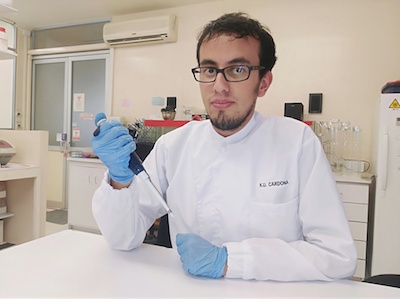 |
Kevin Uriel Cardona Salazar (2018 to 2019) Kevin is an undergraduate Pharmacobiological Chemistry student at Facultad de Ciencias Químicas, Universidad Autonoma de San Luis Potosi. He was involved in the development of a DNA molecular weight marker for in house use as part of his undergraduate social service. |
| Mauricio Ricardo Andrade Escalante (2018 to 2019) Mauricio is an undergraduate Pharmacobiological Chemistry student at Facultad de Ciencias Químicas, Universidad Autonoma de San Luis Potosi. He was involved in the optimisation of HBV and CMV molecular detection methods through qPCR at our lab as part of his undergraduate social service. |
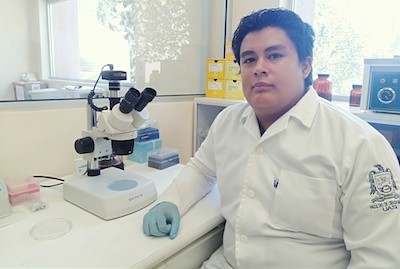 |
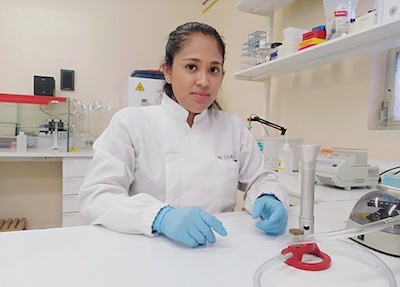 |
Emma Félix Hernández Romano (2018 to 2020) Emma received a bachelor’s degree in Experimental Biology from the Universidad Autónoma Metropolitana (UAM) on 2016. She has worked for the Instituto Potosino de Investigación Científica y Tecnológica (IPICYT's) Medical Biotecnology Laboratory as well as in UAM's Pharmacology Lab. She worked towards obtaining a master's degree developing nucleic acid based methods for the detection of Hantaviruses in wild rodent populations. |
| Dante Irad García Aguilar (2017) Dante holds a bachelor's degree in Computer Science from Facultad de Ingeniería, Universidad Autonoma de San Luis Potosi. He participated as developer and webmaster of the Mouseic project site and was involved in the development of a nucleotide and amino acid Sequence Unanimity Reformating Tool at our lab. |
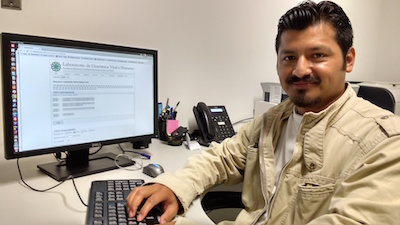 |
| |
Daniel Alejandro Gonzalez Bandala (2016 to 2020) Daniel received a bachelor's degree in Computer Engineering from Facultad de Ingeniería, Universidad Autonoma de San Luis Potosi on 2006. He held a post at the Instituto Potosino de Investigación Científica y Tecnológica (IPICYT's) for a year and subsequently obtained a master's degree in Computer Science from the Centro de Investigación y de Estudios Avanzados del IPN (CINVESTAV) on 2011. Daniel has been a professor at Universidad Politécnica de Victoria and Universidad Autónoma de Tamaulipas FCAV and CINOTAM. He worked towards obtaining a doctorate degree at Facultad de Ingeniería, UASLP developing artificial intelligence algortihms for use in the prediction of emerging infectious disease outbreaks. |
| José Salomón Altamirano Flores (2016 to 2020) Salomon received a bachelor's degree in Informatics from Instituto Tecnológico de Matehuala on 2005. He worked for San Luis Potosi's State Public Health System and subsequently obtained a master's degree in Computer Science from Instituto Tecnológico de Leon, Guanajuato on 2015. He worked towards obtaining a doctorate degree applying intelligent systems (artificial neural networks) to the identification of genetic associations with HIV clinical endpoints at Facultad de Ingeniería, Universidad Autonoma de San Luis Potosi. |
|
| |
Thelma Anahí Martínez José (2016 to 2018) Anahí is currently studying towards her bachelor's degree in Informatic Engineering at Facultad de Ingeniería, Universidad Autonoma de San Luis Potosi. She has participated in the development of the Mexican Infectious Disease Analysis and Surveillance mapping tool (MIDASmap) as part of her social service. |
| Marco Antonio Govea Niño (2016) Marco holds a bachelor's degree in Informatic Engineering from Facultad de Ingenieria, Universidad Autonoma de San Luis Potosi. During his social service he participated in the development of the Mexican Infectious Disease Analysis and Surveillance mapping tool (MIDASmap). |
|
| |
Octavio Medina Avila (2016) Octavio Marco holds a bachelor's degree in Informatic Engineering from Facultad de Ingenieria, Universidad Autonoma de San Luis Potosi. During his social service he participated in the development of the Mexican Infectious Disease Analysis and Surveillance mapping tool (MIDASmap). |
| Samuel Mora Andrade (2015 to 2017) Samuel obtained a bachelor's degree in Veterinary Medicine from Universidad Autónoma de Aguascalientes. He was involved in exotic viral pathogen screening in wild bat populations of the Mexican state of San Luis Potosí including: WNV, RABV, MERS-CoV and SARS-CoV. He worked towards obtaining a Masters degree at our lab. |
|
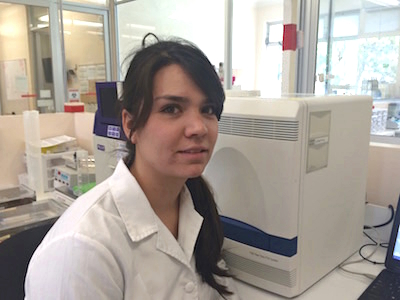 |
Maria Fernanda Wong Arce (Summer 2016, 2017 to 2019) Fernanda received her bachelor's degree in Bioprocess Engineering from Facultad de Ciencias Químicas, Universidad Autónoma de San Luis Potosí. During the summer of 2016 she worked at our lab as a pre-graduate student in a project resolving HLA-C group C2 and C1 allotypes in a Mexican HIV cohort. She also obtained a master's degree at our lab and was involved in an arbovirus surveillance study (Dengue, Zika & Chikungunya) as wwell as at developing a passive mosquito trap. |
| Bunga Diela (Summer 2015) Bunga participated as a visiting international student for a 3 month period during her third year of training as part of her Medical Doctor's degree from Universitas Padjadjaran, West Java Indonesia. She was involved in the characterisation of full-genomic sequences of Mexican Hepatitis B virus (HBV) isolates. She obtained her medical degree on Sept 2017 and is currently a postgraduate exchange student based in Parma, Italy. |
|
| |
Itzel B. Jiménez Velázquez (2014 to 2015) Itzel holds a Medical Doctor's degree from Universidad de Guadalajara. During her master's degree studies she worked on a project studying the phenotypic frequency of a Single Nucleotide Polymorphism (SNP) located -35 kb upstream of the HLA-C promoter (rs9264942) in both a reference and HIV-infected Mexican mestizo cohort. She was also involved in determining the clinical role that HLA-C and KIR2D constelations have in HIV disease progression and clinical endpoints. |
| Diana Lorena Alvarado Hernández (2009 to 2013) Diana holds a bachelor's degree in Chemistry from Facultad de Ciencias Químicas UASLP and a master's degree in environmental toxicology from Laboratorio de Salud Genero y Medio Ambiente, Facultad de Medicina, Universidad Autonoma de San Luis Potosi. She obtained a doctorate's degree at our lab describing the clinical relevance of Killer-cell Immunoglobulin-like Receptor (KIR) diversity in the context of human CMV infections in 2013. She has been a full-time professor at Universidad Cuauhtémoc and Universidad del Centro de México of San Luis Potosí. |
|
| |
Daniel Hernández Ramírez (2009 to 2015) Daniel holds a bachelor's degree in Chemistry and a master's degree in ion channel physiology from Facultad de Ciencias Químicas, Universidad Autonoma de San Luis Potosi. He earned an additional master's degree from Posgrado en Ciencias Biomédicas Básicas, Facultad de Medicina in 2009. He obtained a PhD at our lab during 2015 after determining the clinical and epidemiological relevance of KIR gene diversity in Human immunodeficiency virus (HIV) infections among Mexican mestizos. He currently holds a post-doc position at Centro de Biociencias, UASLP. |
| Pedro Gerardo Hernández Sánchez (2009 to 2018) Pedro obtained a bachelor's degree in Biochemical Engineering from Instituto Tecnológico de la Paz, Baja California Sur. His work on HIV-1 pol region genomics earned him both a master's and a doctorate's degree on Basic Biomedical Sciences from our lab. He worked on studying the molecular epidemiology of anti-retroviral (ARV) drug resistance mutacions in HIV-1 infected patients. He is currently an associate researcher of Dr. Daniel Noyola's Virology Lab at Facultad de Medicina, UASLP. |
|
| |
Hugo Israel Contreras Treviño (2009 to 2011) Hugo obtained a bachelor's degree in Chemistry from Facultad de Ciencias Químicas, Universidad Autonoma de San Luis Potosi and a master's degree in Basic Biomedical Sciences at our lab. During his post-graduate studies he developed nucleic acid based methods for the detection and genomic characterisation of pre-pandemic Influenza viruses. He obtained a doctorate's degree from Universidad Nacional Autónoma de México (UNAM) working with cell translation inhibition mechanisms of the rotaviral NSP3 protein. He is currently a full time professor at Facultad de Ciencias de la Salud, of the Universidad Latinoamericana, Campus Valle, in Mexico City. |
| Sandra Elizabeth Guerra Palomares (2008 to 2016) Sandra holds a bachelor's degree in chemistry from Facultad de Ciencias Químicas, Universidad Autonoma de San Luis Potosi. Her work on Blood-borne pathogen genomics, molecular epidemiology and molecular methods earned her a master's degree in Basic Biomedical Sciences at our lab. She continued working with Vif-Vpr HIV accessory protein genomics earning a doctorate's degree in 2016 at our lab. Sandra continues to work as an associate researcher at the Laboratorio de Genómica Viral y Humana, Facultad de Medicina, UASLP. |
|
| |
Ameyali Baca Alvídrez (2013 to 2014) Ameyali worked at our lab for a year during her 7th year of medical training at Facultad de Medicina, Universidad Autónoma de Chihuahua. She was responsible for establishing an Epstein-Barr Virus (EBV)-transformed B-lymphoblastoid cell-line collection from Mexican Tenek amerindian samples as part of her pre-graduate Medical Research Social Service. She finished her year-long social service stay on July 31st, 2014. |
| Ana Alejandra Maya García (2011 to 2012) Alejandra obtained a bachelor's degree in Bioprocess Engineering from Facultad de Ciencias Químicas, Universidad Autonoma de San Luis Potosi in 2011. During her pre-graduate internship she participated in developing nucleic acid testing strategies for the identification and subtyping of Denguevirus in human samples. She is currently a pharmaceutical advisor at Beneficiencia Española de San Luis Potosí. Ana finished her year-long stay on April 5th, 2012. |
|
| |
José Luis Ramírez García-Luna (2010 to 2011) José Luis obtained a medical degree from Facultad de Medicina, Universidad Autonoma de San Luis Potosi in 2011. During that same year he compiled clincal follow-up information for HIV-patients included in the Mexican Genomic DNA Collection (HIV/AIDS cohort) as part of his undergraduate social service. He obtained a master's degree in Clinical Research Science at the Department of Clinical Epidemiology and Public Health, Facultad de Medicina, UASLP. Jose Luis is currently enroled in a PhD program at McGill University, Montréal. |
| Montserrat Barriga Moreno (2008 to 2009) Montserrat obtained a medical degree from Facultad de Medicina, Universidad Autonoma de San Luis Potosi in 2009. During that same year she participated in the development, optimization and protocolization of tissue culture methods as part of her pre-graduate medical school social service. She participated in establishing the Mexican Genomic DNA Collection mononuclear cell bank, she is currently a physician at EVIC Hispania and Banc de Sang I Teixits and an outstanding actress in Barcelona, Spain. |
|